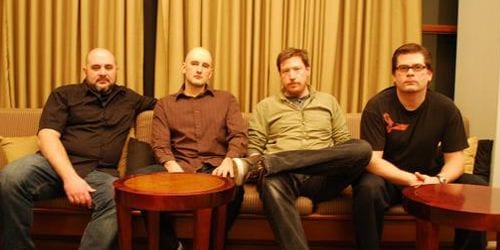
Black Helicopter plays the kind of music that grown up punks would make. It’s still heavy and owes something to a noisy past, but it’s starting to take itself a little more seriously. Some of the narratives provided by the lyrics paint the picture of a guy in his 30s, sort of down and out, not entirely responsible, who has a bit of nostalgia but ultimately looks at life with a certain detachment. The vocals reflect this attitude with a sarcastic delivery, reminiscent of ’90s alt-rock: Tim Shea talks-sings his words as if saying them might be a bit painful.
On the album opener, “The Invasion of Prussia”, a heavy repetition of chords is laid down before the vocals come in, ready to tell a story, apparently about the Russian invasion during WWI. The way Shea begins to sing sounds more like the recitation of poetry and this delivery immediately put me off. The hard and dark sound opens up too much to make room for these words, enunciated with hard R’s (even though Black Helicopter is from Boston). The groove plays second fiddle to the vocals, which themselves are not very interesting. After a full album of the same tempo, the same unemotional vocals, and the same plodding heaviness, the boredom seems to beat you into submission. The songs did find their way into my head, but I’m not sure I was too happy about that.
The hard thickness of the music paired with the nearly singing vocals (always straining at the limits of its range) make for a brand of alt-rock that sounds very mid-’90s. With the heavy mathematical feel of the music and the inevitable sarcasm of the lyrics, one could imagine Black Helicopter enjoying quick fame back then in the Buzz Bin before going back to the underground college circuit. That was the prime time for this kind of sound. Although a return to the sounds of the ’90s seems to be occurring, often in the form of a shoegaze revival, these guys don’t seem too excited about it. They’re like a ’90s influenced bar band: more than competent, but maybe less than inspired. What’s missing with Black Helicopter is the punk-influenced energy that still was a big part of the more interesting rock music back then. Now and then a glimpse of that energy comes through, but it either dies down or gets flattened out by the slick production.
Black Helicopter has a thick sound, but without much texture. Or at least the production works against the complication of the sound. The guitars are nice and heavy, and occasionally find an extra layer of acoustic that deepens and softens them up. There are often cool little leads going on throughout the song, but they stay quietly below the rhythm guitar and pounding bass. Some “la-la” backup vocals come in now and then to round a song out, but the overall tone doesn’t change much. This album sounds nice and clean: All of the instruments come through crisply, and the vocals have a secure and clear place above — perhaps too clear. It’s all very professional, the production, the musicianship. These guys are true rock and roll journeymen.
That sheen blinds you what really might be going on here. They’ve cut away all the scruff. But what’s left isn’t a really infectious bare bones rock. The songs move in a dirge, ploddingly mid-tempo. The melodies never really become melodies and are not very memorable. What’s missing is feeling.
Black Helicopter is strongest when it make noise. The vocals go away and the two guitars interweave with feedbacky solos. It’s nice to hear the sound thin out momentarily from the intense chordage to these melodic lines. The most successful instance of this happens on “King Shit”, in the middle, when the two guitars explore the range of the chords that make up the song with lines of notes that are more interesting than the vocal melody. “Under the Bus” employs the two guitars amazingly with a nice double solo. This is what a two-guitar band needs to be doing. On “The Invasion of Prussia”, near the end of the song, Black Helicopter finds its way into a sound that, if carried further, would make the band much better. The noise for a moment drowns out the too-distinct separation of the vocals from the sound, letting Tim Shea yell-sing in the midst of the fray. It’s almost exciting. Almost. But instead the album is too restrained, too methodical, too good — and just good, nothing more.

![Call for Papers: All Things Reconsidered [MUSIC] May-August 2024](https://www.popmatters.com/wp-content/uploads/2024/04/all-things-reconsidered-call-music-may-2024-720x380.jpg)



